An exhibit about the Servant of God Metropolitan Andrey Sheptytsky took place in Philadelphia
Thursday, 06 November 2014, 11:08 On November 6th as part of the autumn semester of the courses of the Saint Sophia Association, USA (TCC a) and the NTSh Work Center in Philadelphia, there was a presentation of the Photo Exhibit “Servant of God Andrey Sheptytsky (1865-1944)” to mark the 70th anniversary of the passing into eternity of a great UGCC Metropolitan.
-
See also:
- God’s truth will prevail: How the Ukrainian Catholic Metropolia of Philadelphia helps Ukrainians during the war?
- “Vacation with God: The Holy Family”: Summer Camp for Children in Philadelphia
- The Head of the UGCC to the participants of the forum Massive artificial famines: Our task is to spread truth about Holodomor
The photo exhibit was prepared in Lviv on the basis of unique documents and photographs from the funds of Lviv State Archives. A well-founded presentation on the life and activities of Metropolitan Andrey was given by Rev. Lic. Yaroslav Semehen, president of St. Sophia Association in Rome. The speaker sketched basic biographical facts about the Servant of God, the main aspects of his extensively varied work on church as well as political terrains. A prominent theologian, well-versed in Eastern Theology and traditions as well as in the Western one, an ascetic, a teacher of the Church, a preacher of spiritual life, Metropolitan Andrey already in his lifetime was recognized by the Ukrainian people as “Our Moses”.
Among the notable achievemnets of Metropolitan Andrey – the development of the structure of the Ukrainian Greek-Catholic Church not only in Ukraine but also beyond its borders. He visited Russia and Belarus twice (1907 and 1912). He enhanced the development of the Russian Greek-Catholic Church. In 1917, in Petersburg, the Russian Greek-Catholic Exarchate was pronounced and Rev. Leonid-Leontiy Fodorov was appointed its Exarch. He created an Apostolic Vicarate for Greek-Catholic faithful in Bosnia, attained the appointment of a bishop for USA (Soten Ortynskyj – 1907) and for Canada (Mykyta Budka – 1912).
The Metropolitan appointed Rev. Mykhaylo Tsehelskyj as Eksarch for Catholics of the Byzantine Rite in Ukraine. In 1910, he participated in the Eucharistic Congress in Montreal. Andrey Sheptytsky was the initiator of the uniate Velehrad Congesses (1907-1928), In Belgium he created an Eastern branch of the Benedictine Order. In 1901 he founded the Monastery of the Studite Order, whose superior became his own brother, Kazymyr-Klymentiy. In 1913 he invited the Redemporist Fathers who accepted the Byzantine Rite, to Halychyna. He looked after the women congregations: Sister Servants, Holy Family, Studite, Mercy, St.Priest-Martyr Josaphat. He called together UGCC Synods and Sobors (1905, 1940, 1944). The metropolitan did not abandon his people during World War I and II.
In realizimng his international authority and the meaning of his work for UGCC, the tsarist Russian regime in September 1914 arrested him and sent him into exile to the Suzdal Spaso-Efremov Monastery where he remained until 1917. During the interwar period, the Metropolitan continued his work on developing UGCC.
Considering the development of education and culture to be a means of defense for an enslaved people, Metropolitan Andrey established the Ukrainian National Museum (1905), defended the necessity of creating a Ukrainian university in Lviv, supported private schools, such as the B. Hrinchenko, Prince Danylo, M.Shashkevych Ukrainian School – the only one in the city; associations, such as: Prosvita, Ridna Shkola, Shevchenko Scientific Association; and libraries, schools for vocational and high school youth, numerous youth organizations; enhanced the publication of journals for youth: “Nash Pryiatel” [Our Friend]; Postup [Progress], Ukrainske Yunatstvo [Ukrainian Youth]. In his person there was a hopeful intermediary and patron for young artists, musicians. Looking out for the physical health of his people, Metropolitan Sheptytsky opened a People's Clinic (1903), A counseling center for mothers, kindergartens, and orphanages. He helped to develop economic enterprises (Ipotechnyj Bank, Dnister, a Society for Mutual Insurance, and others).
As UGCC Head, through his persistent work, he demanded that the Ukrainian nationalist group adhere to Christian principles of patriotism, and that the Church take on the role of a spiritual and moral authority for the Ukrainian people. The goal of the Metropolitan's life was the unity of the Ukrainian Church and the building of a Ukrainian nation, “endowed with a Christian soul.” Through his titanic work he successfully he captured and awakened all Church and national life in all of its activities. He was the carrier of bright, even genius ideas, but he delegated their realization to others.
Rev. Semehen quoted fragments from the Autobiography of Metropolitan Andrey Sheptytskly written by PatriarchYosyf Slipyj on the 15th anniversary of the death of Servant of God Andrey in 1958. The Patriarch wrote this during his exile in Maklakov, Krasnoyarskyj land. In this document Yosyf Slipyj accentuates the deep faith of Metropolitan Andrey, his love of books, his care for orphans. One of Andrey Sheptytsky's priorities was to bring the Ukrainian issue to the world arena. According to the words of the Pariarch, the foresight of the Servant of God had a prophetic characteristic, after all, his desire was to look “500 years into the future”. His aristocratic background never impeded his ability to communicate with all levels of society, and the commitment to the Ukrainian cause was marked by a multi-form dimension. The audience had the opportunity to look at 14 stands of photos which became the photo-chronology of the life of Metropolitan Andrey.

We can imagine what the prayer of the prisoners in the Russian torture centers in the Ukrainian Kharkiv region was like – Head of the UGCC on the 206th day of the war 17 September
A vast cemetery, a mass burial, was found near the city of Izyum, in which more than 400 innocently killed and tortured people have already been...
-
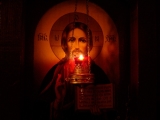 Глава УГКЦ у 158-й день війни: «Нехай Господь прийме з уст нашої Церкви псалми та моління за всіх тих, які особливо просять нашої молитви»
Глава УГКЦ у 158-й день війни: «Нехай Господь прийме з уст нашої Церкви псалми та моління за всіх тих, які особливо просять нашої молитви»
-
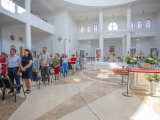 «Сила, яка походить із вірності Христові, є стержнем, який ніхто не може зламати», – Блаженніший Святослав
«Сила, яка походить із вірності Христові, є стержнем, який ніхто не може зламати», – Блаженніший Святослав
-
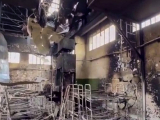 Глава УГКЦ у 157-й день війни: «В ім’я Боже ми засуджуємо звірства в Оленівці і світ повинен це засудити як особливий вияв дикості й жорстокості»
Глава УГКЦ у 157-й день війни: «В ім’я Боже ми засуджуємо звірства в Оленівці і світ повинен це засудити як особливий вияв дикості й жорстокості»
-
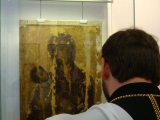 «Боже, почуй наш плач і поспіши нам на допомогу і порятунок!», – Глава УГКЦ у 156-й день війни
«Боже, почуй наш плач і поспіши нам на допомогу і порятунок!», – Глава УГКЦ у 156-й день війни
-
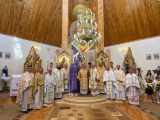 «Бог йому дав серце і душу українського народу»: відбулася щорічна проща до Прилбичів з нагоди уродин митрополита Андрея Шептицького
«Бог йому дав серце і душу українського народу»: відбулася щорічна проща до Прилбичів з нагоди уродин митрополита Андрея Шептицького
-
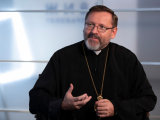 Глава УГКЦ: «Я горджуся українськими патріотами, які без найменшої краплі ненависті готові захищати своє»
Глава УГКЦ: «Я горджуся українськими патріотами, які без найменшої краплі ненависті готові захищати своє»
-
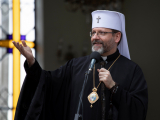 Блаженніший Святослав закликав українську молодь скласти присягу на вірність Христові
Блаженніший Святослав закликав українську молодь скласти присягу на вірність Христові
-
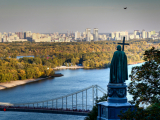 Глава УГКЦ у 155-й день війни: «Помолімося, щоб не втратити скарбу віри князя Володимира»
Глава УГКЦ у 155-й день війни: «Помолімося, щоб не втратити скарбу віри князя Володимира»
-
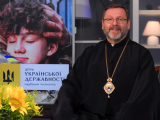 Блаженніший Святослав у День державності України: «Наша Держава – це для нас питання життя або смерті»
Блаженніший Святослав у День державності України: «Наша Держава – це для нас питання життя або смерті»
-
 Глава УГКЦ у 154-й день війни: «Нехай Господь Бог прийме у свої вічні обійми журналістів, які віддали за правду своє життя в Україні»
Глава УГКЦ у 154-й день війни: «Нехай Господь Бог прийме у свої вічні обійми журналістів, які віддали за правду своє життя в Україні»
-
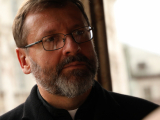 Глава УГКЦ у 153-й день війни: «Принесімо наш біль перед Боже обличчя і будьмо певні, що Він нас вислухає»
Глава УГКЦ у 153-й день війни: «Принесімо наш біль перед Боже обличчя і будьмо певні, що Він нас вислухає»
-
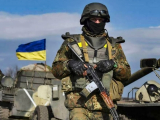 Глава УГКЦ у 152-й день війни: «Помолімся молитву заступництва за наших воїнів»
Глава УГКЦ у 152-й день війни: «Помолімся молитву заступництва за наших воїнів»
-
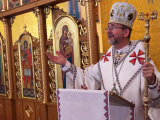 «Віруюча людина не може бути байдужою, коли бачить страждання іншої людини», – владика Богдан Дзюрах
«Віруюча людина не може бути байдужою, коли бачить страждання іншої людини», – владика Богдан Дзюрах
-
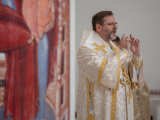 «Серед нашого страждання творімо простір для прояву Божої всемогутності», – Глава УГКЦ у 6-ту неділю після П’ятдесятниці
«Серед нашого страждання творімо простір для прояву Божої всемогутності», – Глава УГКЦ у 6-ту неділю після П’ятдесятниці
-
 Глава УГКЦ у 151-й день війни: «Російське віроломство ми перемагаємо силою любові до нашої Батьківщини»
Глава УГКЦ у 151-й день війни: «Російське віроломство ми перемагаємо силою любові до нашої Батьківщини»

